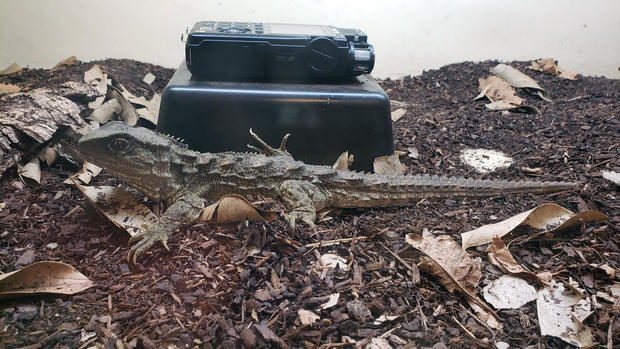Singing sea turtles among dozens of vocal animal species once thought to be silent
It turns out that birds, amphibians and mammals aren't the only animals to communicate by sound. Scientists have discovered dozens of animal species that were once thought to be silent, but are actually vocal communicators – including singing sea turtles and acoustic-producing living fossils.
An international research team found evidence that 53 species of four major vertebrate organism groups – turtles, tuataras, limbless amphibians and lungfishes – all of which were thought to be silent creatures, actually intentionally create sound to communicate. Their findings were published in Nature Communications on Tuesday.
Gabriel Jorgewich-Cohen, a Ph.D. student at the University of Zurich's Paleontological Institute and Museum and lead author of the study, said their findings provide evidence of "acoustic abilities in several groups previously considered non-vocal."
He specifically pointed to turtles, which his team found show "broad and complex acoustic repertoires." Turtles will make sounds to indicate when they are ready to mate, he said, but they also communicate with each other long before that – before they even hatch.
"Sea turtles will sing from within their egg to synchronize hatching," he said in an interview BBC News. "If they call from inside, they all come out together and hopefully avoid being eaten."
One type of sea turtle, Natator depressus, otherwise known as the flatback turtle, was recorded making sounds that resemble croaks, scrapes and chirps. And the South American river turtle makes sounds while caring for its young, Jorgewich-Cohen said.
Acoustic sounds were also detected being made by tuataras – lizard-esque creatures whose closest relatives are now-extinct reptiles that once roamed with dinosaurs – as well as a species of caecilian and the South American lungfish, which reside in water but have lungs that require air to survive. Jorgewich-Cohen told CBS News that males of most species produce sounds during courtship and that some will make sounds when fighting members of their same species.
Researchers did not include defensive sounds in their research, such as lizards hissing and sniffing.
With these findings, Jorgewich-Cohen's team was also able to trace the evolution of vertebrate vocalization and map vocal communication in the vertebrate tree of life. That mapping proved that this communication style is an ancient technique that did not evolve among various groups, but from a common origin.
That origin, researchers said, existed about 407 million years ago during the Devonian period – a time when the Gondwana supercontinent was still intact and the "Age of Fishes" began.
Despite this ancient origin, it's taken years for scientists to make these discoveries about vertebrate communication. Jorgewich-Cohen told CBS News there are "many reasons" for such a delay.
"Science is human biased and we tend to focus on things that we can easily perceive. The fact that frogs, birds and mammals produce frequent audible sounds makes them good study models," he said, adding that many of the species his team studied were understudied because they were not as obviously vocal.
"The fact that sounds suffer refraction from water also makes it harder for us to hear," he added. "Furthermore, some of these species don't vocalize as often as birds do. Some don't vocalize very loud, and some are so rare that most people never get to see them."
For Jorgewich-Cohen, these findings are only the beginning of his research. He told the American Association for the Advancement of Science that he is furthering his studies to compare the sounds made by land vertebrate and lungfish to those made by other fish to create a more accurate and detailed evolutionary tree.
"Do we share the ability of sound production with some group of fish?" he asked during the interview. "If yes, the origins of acoustic communication must be much older than what we hypothesize."





